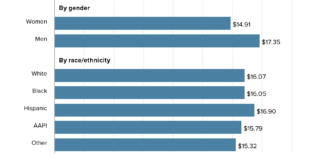 To address this question we start with a recent post by Kevin Drum (10/23/2020): Are Black Homeowners Suffering from Slow Price Growth?
To address this question we start with a recent post by Kevin Drum (10/23/2020): Are Black Homeowners Suffering from Slow Price Growth?
There’s no question that homes in majority-Black neighborhoods are undervalued compared to similar homes in majority-White neighborhoods, but do they also appreciate more slowly?
The article goes through four charts with the last one copied here.
However, if I were forced to choose one of these as the most telling, I’d take the Zillow chart since its data covers the entire nation and it provides a useful time series that fits what I know about the bubble-era lending industry—although I’d sure like to see it extended to the present. It shows that over a somewhat longish term, home appreciation has been lower in Black neighborhoods than in white neighborhoods, primarily because of a huge drop following the housing bubble. The culprit here, however, is not Black neighborhoods per se, but the mortgage industry, which oversold to Black borrowers during the bubble and drove prices far higher than even normal bubble standards. That wretched episode has been documented in considerable detail in a lot of places, but you can read a good outline here if you want to learn more.
One of the articles linked to is Devaluation of housing in black neighborhoods, Part 2: Appreciation by Joe Cortright (7/24/2019):
A key question the Brooking’s report leaves unanswered is whether the black/white housing differential is larger or smaller than it was 10 or 20 years ago. If it was larger in the past and is smaller today, that implies that homes in majority black neighborhoods, although still undervalued relative to homes in predominantly white neighborhoods, have enjoyed greater relative appreciation. From the standpoint of wealth creation, the amount of appreciation since you bought your home is likely to matter more than whether the current price of your house is more or less than otherwise similar properties. Another way of expressing this is that homeowners in black neighborhoods had a lower purchase price (or basis) in their home, and even though it is still undervalued, it may have gained more value in percentage terms than homes in non-majority black neighborhoods.
Indeed, Dan Immergluck and his colleagues at the Georgia State University found that for those who bought homes in 2012, price appreciation for black homebuyers from 2012 through 2017 was higher than for white homebuyers. Immergluck’s data show that in most markets, homes bought by black buyers appreciated more than homes bought by white homebuyers.
This article also references the Zillow study, A House Divided – How Race Colors the Path to Homeownership by Skylar Olsen (1/15/2014), which includes a number of graphs related to homeownership by race. As Drum notes it would be nice if this study was updated.
